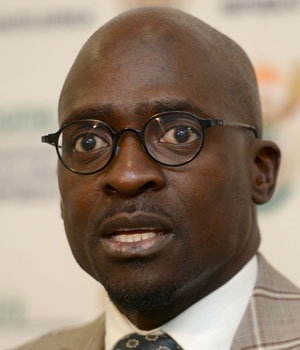
The government is going to hike the rate of Value Added Tax this year for the first time in 25 years to help plug a R48 billion shortfall in revenue collections.
Finance Minister Malusi Gigaba announced during his maiden budget speech in Parliament today that the rate of VAT would increase from 14% to 15%.
VAT was first introduced in 1991 at a rate of 10% before it was increased to 14% in 1993.
“This is not the first of many VAT rate increases under this administration. Government has been conservative enough in terms of VAT. The democratic government is raising the level of VAT for the first time since it came about in 1994. It is not something you play around with,” Gigaba said at a media conference today.
“We’ve been sufficiently conservative up until a point where it became absolutely necessary to do this,” he added.
Gigaba characterised the budget as “tough, but hopeful” but acknowledged that it would be an unpopular budget given measures like the hike in the VAT rate.
“We have increased personal income tax significantly in recent years, particularly at the higher income bands, and our corporate tax is high by international standards. We have not adjusted VAT since 1993, and it is low compared to some of our peers,” he said.
“We therefore decided that increasing VAT was unavoidable if we are to maintain the integrity of our public finances. The current zero-rating of basic food items such as maize meal, brown bread, dried beans and rice will limit the impact on the poorest households,” Gigaba added in his budget speech.
“Vulnerable households will also be compensated through an above average increase in social grants,” he said.
Gigaba announced above-inflation hikes in social grant values that would result in an extra R2.6 billion going to social grants.
As a result, the old age, disability and care dependency grants will increase on April 1 2018 from the existing R1600 by R90 to R1690 and by an additional R10 to R1700 on October 1 2018.
The child support grant will increase from the baseline of R380 to R400 on April 1 and to R410 on October 1.
This is a 6.6% annual increase.
“Some relief will be provided for lower income individuals through an increase in the bottom three personal income tax brackets and the rebates. In addition to VAT, we are increasing excise duties on luxury goods and estate duty on wealthy individuals,” Gigaba added.
“Taken together, we believe these proposals best protect the progressive nature of our tax regime, to minimise the impact on lower-income households,” he said.
“The wealthiest 30% of households contribute 85% of VAT revenue,” the budget review said.
The increase in the rate of VAT along with below-inflation adjustments to personal income tax brackets are the key measures that Gigaba is planning to put through in order to raise an additional R36 billion in the 2018/19 tax year.
“Despite an improved outlook, government still faces a revenue gap of R48.2 billion in the current year, which carries through to the outer years of the medium-term expenditure framework,” Gigaba said.
In October last year, Gigaba put the revenue shortfall at nearly R51 billion.
Away from VAT and personal income tax adjustments, Gigaba will be putting through the following tax hikes:
• An increase in the ad valorem excise duty rate on luxury goods from 7% to 9%;
• A higher estate duty tax rate of 25% for estates greater than R30 million;
• A 52 cents per litre increase in the levies on fuel, made up of a 22 cents per litre increase for the general fuel levy and a 30 cents per litre increase in the Road Accident Fund Levy; and
• Increases in the alcohol and tobacco excise duties of between 6% and 10%.
Turning to debt, Gigaba said at the time of the medium-term budgetary policy statement in October last year, government debt was shown to be on an unsustainable path.
“Debt-service costs were also projected to rise, crowding out social spending,” he added.
Over the next three years, Gigaba said that expenditure reductions had been approved by Cabinet, amounting to R85 billion.
“These fiscal proposals will cause economic discomfort, but they are necessary to protect the integrity of the public finances,” he added.
As a result of the expenditure cuts and marginally better growth forecasts, the government’s consolidated deficit is projected to narrow from 4.3% of GDP in 2017/18 to 3.5% in 2020/21.
Gigaba said the budget speech presented a budget outlook which was markedly improved since the medium-term budgetary policy statement in October; it now projects debt stabilising as a share of GDP over the medium term.
The main budget primary deficit closes over the medium term, helping to stabilise the gross debt-to-GDP ratio at 56.2% of GDP in 2022/23, and declining thereafter.
“The 2018 budget accelerates government’s efforts to narrow the budget deficit and stabilise debt, laying the foundation for faster growth in the years ahead,” the 2018 budget review said.
“Budget 2018 charts a path out of economic stagnation, anticipating a steady increase in economic growth which will create a path to prosperity for our people, and improve our nation’s finances over time,” Gigaba said.
The National Treasury hiked its 2017 GDP growth projection to 1%, which is higher than the 0.7% expected at the time of medium-term budgetary policy statement last year.
“We are anticipating growth of 1.5% in 2018, rising to 2.1% in 2020,” Gigaba said.
Last October, Gigaba put growth for 2018 at 1.2% and 2020 growth at 1.9%.
“The gains from progress made by government action are important but insufficient to achieve transformation and inclusive growth,” Gigaba said.




 Publications
Publications
 Partners
Partners








